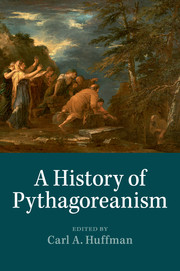Book contents
- Frontmatter
- Contents
- Contributors
- Abbreviations
- Introduction
- Chapter 1 Pythagoras
- Chapter 2 Philolaus
- Chapter 3 Archytas
- Chapter 4 Sixth-, fifth- and fourth-century Pythagoreans
- Chapter 5 The Pythagorean society and politics
- Chapter 6 The Pythagorean way of life and Pythagorean ethics
- Chapter 7 Pythagoreans, Orphism and Greek religion
- Chapter 8 The problem of Pythagorean mathematics
- Chapter 9 Pythagorean harmonics
- Chapter 10 The Pythagoreans and Plato
- Chapter 11 Aristotle on the “so-called Pythagoreans”: from lore to principles
- Chapter 12 Pythagoreanism in the Academic tradition: the Early Academy to Numenius
- Chapter 13 The Peripatetics on the Pythagoreans
- Chapter 14 Pythagoras in the historical tradition: from Herodotus to Diodorus Siculus
- Chapter 15 The pseudo-Pythagorean writings
- Chapter 16 Pythagoreans in Rome and Asia Minor around the turn of the common era
- Chapter 17 Diogenes Laertius’ Life of Pythagoras
- Chapter 18 Porphyry's Life of Pythagoras
- Chapter 19 Iamblichus’ On the Pythagorean Life in context
- Chapter 20 Pythagoras and Pythagoreanism in late antiquity and the Middle Ages
- Chapter 21 Pythagoras in the Early Renaissance
- Bibliography
- General index
- Index locorum
- Greek index
Introduction
Published online by Cambridge University Press: 05 May 2014
- Frontmatter
- Contents
- Contributors
- Abbreviations
- Introduction
- Chapter 1 Pythagoras
- Chapter 2 Philolaus
- Chapter 3 Archytas
- Chapter 4 Sixth-, fifth- and fourth-century Pythagoreans
- Chapter 5 The Pythagorean society and politics
- Chapter 6 The Pythagorean way of life and Pythagorean ethics
- Chapter 7 Pythagoreans, Orphism and Greek religion
- Chapter 8 The problem of Pythagorean mathematics
- Chapter 9 Pythagorean harmonics
- Chapter 10 The Pythagoreans and Plato
- Chapter 11 Aristotle on the “so-called Pythagoreans”: from lore to principles
- Chapter 12 Pythagoreanism in the Academic tradition: the Early Academy to Numenius
- Chapter 13 The Peripatetics on the Pythagoreans
- Chapter 14 Pythagoras in the historical tradition: from Herodotus to Diodorus Siculus
- Chapter 15 The pseudo-Pythagorean writings
- Chapter 16 Pythagoreans in Rome and Asia Minor around the turn of the common era
- Chapter 17 Diogenes Laertius’ Life of Pythagoras
- Chapter 18 Porphyry's Life of Pythagoras
- Chapter 19 Iamblichus’ On the Pythagorean Life in context
- Chapter 20 Pythagoras and Pythagoreanism in late antiquity and the Middle Ages
- Chapter 21 Pythagoras in the Early Renaissance
- Bibliography
- General index
- Index locorum
- Greek index
Summary
In recent years, ancient Pythagoreanism has tended to be a field pursued by a narrow group of specialists and ignored by most scholars of ancient philosophy and ancient civilization. The field can look like a morass that is better not entered at all or bridged by time-worn platitudes about Pythagoras. Many discussions of Pythagoras and Pythagoreanism in general works about ancient civilization or Western culture are thus woefully uninformed. For there has been a great deal of important scholarship on Pythagoreanism in the last fifty years, so that the Pythagoras of current scholarship is not your mother's let alone your grandmother's Pythagoras. The crucial moment in modern scholarship on Pythagoreanism was the publication fifty years ago of Walter Burkert's epoch-making study, which appeared ten years later in a revised version translated into English by Edwin Minar with the title Lore and Science in Ancient Pythagoreanism (1972). References to Burkert's book in the footnotes of this volume are surely more frequent than those to any other piece of scholarship on Pythagoreanism. Burkert's Pythagoras was a religious leader and founder of a way of life and not the great mathematician to which many general accounts tenaciously cling. Yet even Burkert's view has not won universal acceptance; Pythagoras the mathematician survives among some scholars even in this book, and there has been significant scholarship that both builds on and reacts against Burkert.
- Type
- Chapter
- Information
- A History of Pythagoreanism , pp. 1 - 23Publisher: Cambridge University PressPrint publication year: 2014



